Daniel Radcliffe and James McAvoy Talk 'Victor Frankenstein' and Off Screen Friendship
- Details
- Category: Interviews
- Created: Friday, 27 November 2015 13:32
- Published: Friday, 27 November 2015 14:14
- Written by Justine Browning
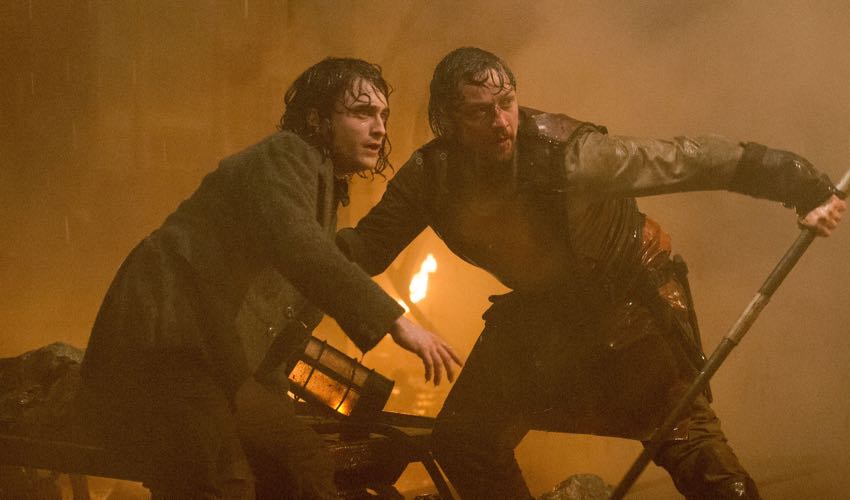
Mary Shelley’s Frankenstein has been adapted for the screen numerous times. The latest version VICTOR FRANKSTEIN, aims to reinvent the chilling tale. James McAvoy stars as the title role while Daniel Radcliffe portrays Egor in what may be viewed as a buddy film.
The sci-fi drama is largely devoted to Egor’s perspective, revealing his dark past and the turmoil he endures while bearing witness to Dr. Frankenstein’s experiments.
At a recent press conference for the film, held at the Crosby Street Hotel in New York, the film’s stars and director Paul McGuigan spoke about breathing new life into a classic story.
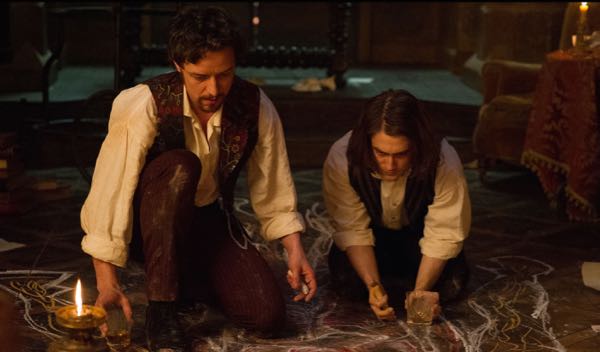
Q: How did your working relationship mirror the fascinating dynamic between Victor and Igor?
Daniel Radcliffe: Thankfully it didn't mirror the relationship between the characters at all in the sense that it is quite an abusive relationship. I think we're fairly similar in terms of our work ethic and the fact that we take the job seriously and we're focused but also we're not saving lives and it is about having fun. We're lucky that we get to work in an industry where we can have a lot of fun while doing our jobs. It was great but thankfully I was not indebted to James forever and he was abusing me and hitting me. It wasn't like that.
James McAvoy: For me the roles were reversed in one big way in that Daniel is the most professional actor I've ever worked with in my life. I'm quite a professional actor and I pride myself in being very professional but to be like, 'Wow, I'm learning from him,' that was kind of nuts.
Radcliffe: That's weird
McAvoy: Just because you're ten years younger than me if not more but actually you're way more experienced than I am and hugely professional. Way more professional than some people I've worked with who have been in the business for 40 years. It's nuts. It's to be admired. We love each other!
Radcliffe: I'm dying over here.
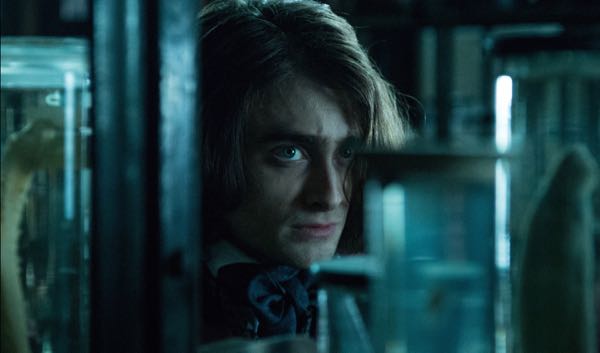
Paul McGuigan: It makes me want to throw up. As far as Mark Gatiss and Andrew Scott, obviously I worked with them on Sherlock. I'm a great believer in working with people that you admire and like and because you've worked with them before so you know exactly how they work and you know exactly what they're capable of. I'd work with James and Daniel in a heartbeat because seeing the amount of effort. They talk about being professional but it goes beyond that. If you want to be smart, you just get the people that you know that are your favorite actors that you like to work with.
Q: How would you say these roles are different from preconceptions about Igor and Victor?
McAvoy: I think Victor has always been maniacally obsessional way back from Mary Shelley's original. What I felt we really went for is that we really went for that in a true sense and we tried to investigate that in a real Post-Freudian world and not just go, well he's a bit energetic and a bit obsessed. Halfway through the book he goes on vacation and comes back completely healthy and sane and goes, 'Oh what the monster's alive? Thank Goodness, I'm really healthy. I can go kill it.
Whereas we tried to stay in a post-Freudian world which is why is he so maniacal, why is he so hyper and bipolar? It's not just because it he is. It's not just because he's a mad scientist. Find the reason for that and then run with it for the whole movie. Don't let him off the hook halfway through the movie so that that when he has to go off and do the bad thing at the end which is kill his own creation, we're suddenly on side with him because he's a good guy. Try and keep him discomfiting, try and keep him that quixotic, mercurial character all the way through,
Radcliffe: For me, there was something really fun about, I think the thing that I liked about the script so much was it took a lot of different preconceptions about Frankenstein and ideas people have about the story or think they know and twisted with them and played around with them and had real fun with that. Part of that was obviously giving Igor a backstory and giving him some real depth than we've seen in terms of that character before and finding out why he would have this incredible loyalty to Victor and why that, despite how bad he's treated a lot of the time, why that never wavers at all. It was to have him be this little creature living this abject, horrible life at the beginning of the film and then he's saved from that and brought into this world where he's empowered in terms of he's got a say and he's got a purpose in life. For me that was very key into how you can suddenly understand his insane devotion to this man even when it is being tested.
McAvoy: He’s lost his hunchback.
Radcliffe: That was one of the things I liked in the script. James touched on this earlier, you have to find ways of honoring all those cliches at the beginning of the film like we do and then you can have some real fun subverting the other ideas that people have about it.
McGuigan: Max's script starts off in a very interesting place because we don't actually get to the point that people are familiar with until to very late on in the film, It was interesting to give Victor Frankenstein back his name a little bit because when you're told of Frankenstein, you think of the monster. It was nice to actually play with that a little bit. Of course at some points in the film, he does become the monster so there was an interesting through line. In the beginnings of reading the script, you go, 'That's interesting, I never thought about that.' It's not just a monster movie, it's a relationship film. It's a film about two men who have a commonality in their passion for science and anatomy and that was interesting to visualise at the beginning of the film so people understand we're at the commonality that is between them and then it just became about this relationship.
McAvoy: It's a book of two halves. The first half is about a scientist's obsession. The second half is much more a Pinocchio story of an existential development of a monster going 'I want to be a real boy.' We still get that Pinocchio story but we get it through Daniel's character. The film is about people, it's about human beings,it's about the people that actually exist and it's about scientists. Max has said the reason he was inspired to write this was about the advent of Facebook. People at the forefront of technological capability using that to implement a massive change in the way that we live our lives and that's why he was inspired to write Frankenstein. It's about two guys with the keys to the kingdom or the fire of the Gods in their hands doing stuff that could be terrible or could change the world for the better- you never know- and how they're always vilified. Then five years we're doing stem cell research anyway. It's about those people rather than just the monster but it's still got cool monster shit in this one.
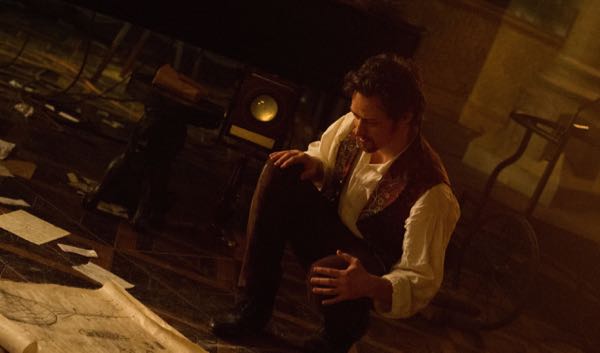
Q: Both of you have played iconic characters before, how did you want to define these two?
McAvoy: It's about two things - trying to marry up what Max Landis wrote and he's writing something that is not just an adaptation of the book. It's not just a remake of an adaptation of previous films,cartoons, comic books, Halloween costumes. It's a combination of the entire zeitgeist-driven collective consciousness perception that we have of what the word Frankenstein means and that's why there's an Igor in it when he was never in the book and that's why other stuff happens. For me it was about trying to marry up the entertainment value- this has to be an entertainment in the same way that Mary Shelley's book was- and it has to be slightly dicey at times and controversial.
That's harder to do these days- people are not as disturbed easily. They're not, we're not as disturbed by a movie that shows two guys trying to become God as much as when she wrote that book when it would have been a massive public outcry and revolutionary. Apart from the fact it was a fucking woman writing the book, that was another level of 'What?" That was the stuff that was controversial back then. It's going to be hard for us now to be controversial. But we still want to make people a little bit shocked sometimes and a little bit grossed out and make it a piece of entertainment, a solid piece of fun at the theater at the same time as making it about somebody who is so driven by... what? It doesn't really allude to it in the book so we had to try and find what that is.
In our case what we found and what Max wrote was loss, grief. He's got this massive hole inside him that no matter how much he tries to fill it in, it doesn't get any smaller,. it just gets bigger and bigger. His ego compensates and he becomes a God in his own head . He's very close to achieving the qualifying factor for becoming a God, the prime requisite for becoming a God is creating life. He's nearly there so he feels pretty massive and Godlike. Those were some of the things that really formed it all in my head, trying to marry up the manic energy that was needed for the entertainment value of the film along with a lot of truth that fuelled it more than just 'Hey, we're having fun!'
McGuigan: I also think that's what interesting is if you take these two guys as actors and you think about it as a filmmaker and you go, what does James bring to this? What does Daniel bring? If you look at it at the analogy of a person or a human, then you would say James is the heartbeat and Daniel is the soul of the film. That was interesting, a certain dynamic happened straight away from day one of filming where you have got two very smart men who got that completely and for a filmmaker who is watching and observing as you do, you can see that energy and you can see that compassion. They both flip over at one point. You could swap them around because of the journey we go through in the movie itself.
Radcliffe: The thing I loved about the script when I read it was it was this big, bold, unapologetically entertaining cinematic action-adventure movie that also had at the heart of it this great and really interesting relationship story between these two guys that is quite a toxic relationship in some ways. They're both essential to each other but I get damaged by him at times. There was a sweetness to Igor as it was written, there is no side to him, there's no edge. What you see is what you get and there's an honesty to how grateful he is to have been taken into this world that I found very appealing and trying to make that as real as possible I suppose.
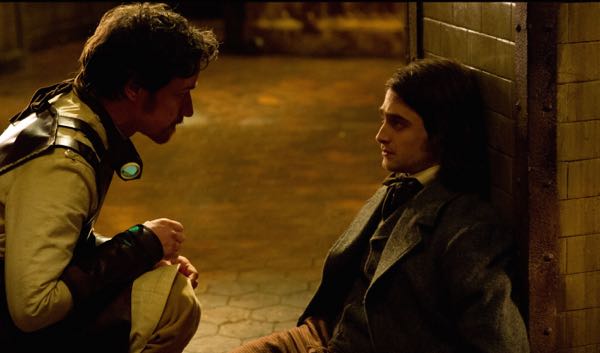
Q: How was it working with Gordon in digital and physical incarnations?
Radcliffe: Gordon was great. We've discovered on the press tour that actually not everyone thinks Gordon is very cute! Because you spend so much time around him, you get a little desensitized! It's like when you hear about people who work with the muppets where you don't talk to the animators, you just talk to the muppets after a while. It was similar with Gordon for me. I would go up and do something to him and then the guys operating him would see that I was doing something and would make him respond at which point you completely forget there are three guys in a box operating this and you start interacting with it .It was one of my favorite animatronic creature effect things I've ever seen. Tia, a stunt girl in a grey suit who I got to do a lot of my fighting with, played Gordon. She was awesome too.
McGuigan: I got to be Frankenstein doing Gordon! He was just called Gordon in the script and I thought what is Gordon? So I went to London Zoo and thought, 'I'll have abit of you, I'll have a bit of that!' 'I'll have a bit of this' and take it all back to these amazing animatronic people. Until the point when Gordon starts running it becomes the CG version but up till that point it's animatronic and old school which I like. Also these guys were doing their own stunts. He [Daniel] was hanging off a staircase with a stunt girl attached to him and James did all his own stuff as well. Gordon became a metaphor for how the film was. It's there in front of you and we made it with different parts of animals. It's half hyena, half monkey, with a dog's leg there as well.
McAvoy: That's why he beat me in the fight because I was intimidated by his girth! When we got the script- you know the film Flash Gordon? Brian Blessed, for me there's an iconic line where he says 'Gordon's alive! Gordon's alive!' I thought I'd get to do that in this film. I think I did do it and it got cut. That's my homage to Brian Blessed up the swanny!
Q: The film is about friendship and loyalty. What is your friendship like?
Radcliffe: I'd heard lots of wonderful, lovely things about James and they'd all transpired to be true. Everybody had said the same thing to me because I've got a lot of friends who I say to, 'I'm working with this person, I'm working with that person', Across the board when I said I was working with James, they said 'Oh you're really going to enjoy that.' People thought of us as being kind of similar and I do think we have a fairly similar work ethic. it wasn't so much being surprised as discovering all the pleasant things I'd heard were true which is nice!
McAvoy: On my first day on set, they came to my trailer door and said 'James, we need you on set.' I thought, 'I'm ready, Well done me, I'm straight out of my trailer and not keeping anyone waiting.' I was quietly proud of myself and then I'm walking to set and I heard Daniel literally running to set and I thought is he going to do that every day? Because otherwise I'm going to lose weight by competitively trying to get there before him. Daniel's enthusiasm for what it is we do sounds like it should be taken for granted but it's actually not always the case. There are a lot of people who have a very self-harming, dysfunctional relationship with acting where it's not good for them, they don't like it, it makes them feel horrible, they wanna hurt themselves and hate everybody for making them do it and yet they're really successful and have been doing it for a long time. Whereas what's really cool about Daniel is [he's like] 'This is our job, we're good at it, really enjoy doing it. Yes, some days are harder than others and some days aren't fun . But that's life.' I just love that attitude because there is no level of front to get through before you get to 'shall we do some nice work and enjoy ourselves.'
Q: How did the hunchback depletion scene develop?
McAvoy: You mean pus in your mouth!
McGuigan: It developed a lot.
McAvoy: To the horror of our producers!
McGuigan: James comes on set and asks for something that looks like pus that he can put in his mouth and everyone was like 'really?' It was his first day on set because we'd done a week of shooting before he was available for us. He came on set and looked at Dan like he looks in the film when he look at him and goes, 'OK. You're ready?' I thought, 'Oh My God, he's going to kill him!' James is very physical, Dan is as well so it was an interesting day. That scene to me sums up the movie to me in a sense- the physicality, smart dialogue, the interaction between the two and the transformation.
McAvoy: When I read the first scene at the circus which is a bit of a cheesy, action scene. That was there and that helped set the tone but for me all the other scenes between Daniel and I seemed really physical. On paper, I don't know whether it was Max intended or whether we brought that. I feel we brought it a bit. I feel the film needed energy and pace and you can do that with editing, music and 'Crash, Bang, Wallop!' But I felt we needed to provide that physical energy. The siphoning off the hump was in the script but the actual idea of siphoning off what the hump contained in terms of the way people sometimes do with gasoline. Did I mention it to you in New York? I was like , 'I wanna do this. I've got this idea.' You were like, 'Cool.' We got there the day before we shot to have a quick rehearsal and said to the prop guys we need some rubber hosing. 'What's he talking about? ' We got the rubber hosing and we did it and everybody kept thinking this just is not going to work. Arguably a lot of the audience might think, 'whoa that didn't work for me' but we managed to get it to work and I'm really proud of myself.
Q: And the line?
McAvoy: That was me. That was made up. There's a lot of made-up shit in every movie and you don't necessarily talk about it or anything like that. For every one line that you make up that gets into a movie, there are fifteen that get cast aside because they are terribly over-egging the pudding. But sometimes you need to add those things in even if they are wrong to learn what is right about what's already in the script.
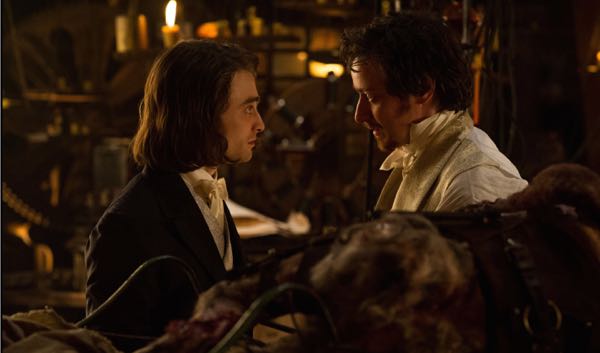
McGuigan: It's always a good day for me when you make all the old Fox producers very nervous. They were great by the way but one took me aside and said, 'Is he going to do that all the time?' I was like, 'Yep. That's the way we're going to do it.' He's quite literally humping him at one point.' They were like 'OK. This is an interesting dynamic.'
Radcliffe: It was great- it was so funny. I just remember the paling faces of producers when I walked off set. There were a couple of people looking… terrified. A making of featurette of an episode in South Park had a line where Trey Parker said we always know we're doing really well when our producer looks terrified. That's a good rule of thumb.